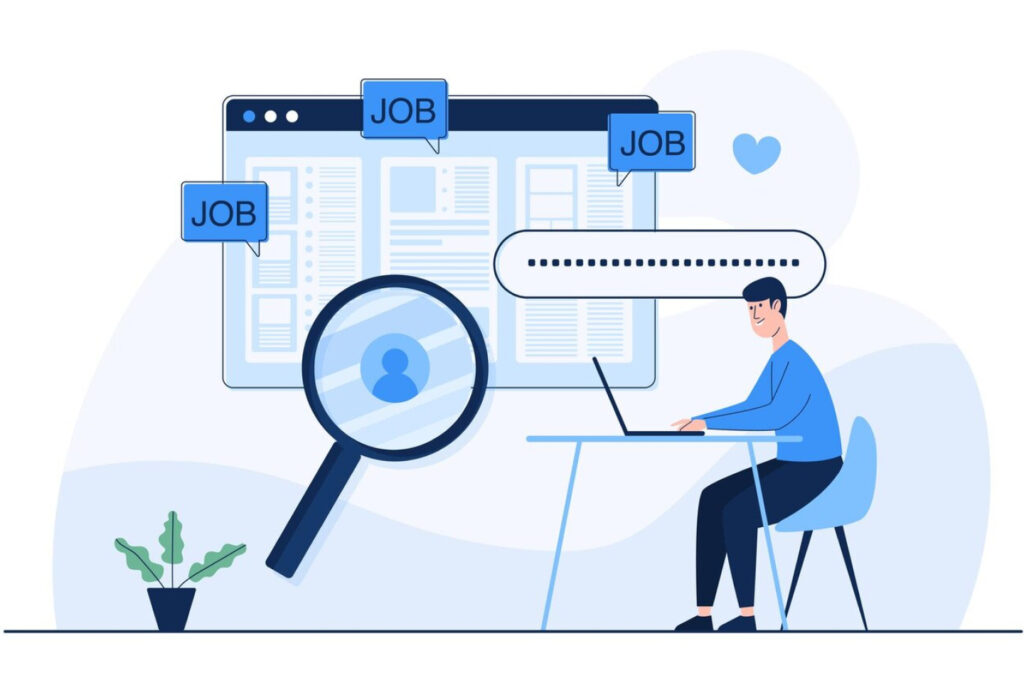Why Am I Not Getting Hired
Why Can’t I Get Hired Anywhere In today’s fiercely competitive job market, finding a fulfilling job can feel like an uphill battle. You’ve sent out dozens of applications, fine-tuned your resume, and even rehearsed for interviews, yet the outcome remains the same: no job offers. This predicament leaves many job seekers asking themselves, “Why can’t…
Why Can’t I Get Hired Anywhere
In today’s fiercely competitive job market, finding a fulfilling job can feel like an uphill battle. You’ve sent out dozens of applications, fine-tuned your resume, and even rehearsed for interviews, yet the outcome remains the same: no job offers. This predicament leaves many job seekers asking themselves, “Why can’t I get hired anywhere?” The truth is, the reasons behind not securing a job are varied and can range from the highly competitive nature of the job market to more personal factors such as lacking specific skills or not presenting oneself effectively during interviews.
Understanding the nuances behind this pressing question can illuminate the path to not just any job, but the right job for you. Whether it’s navigating through the complexities of automated applicant tracking systems, enhancing your personal branding, or mastering the art of the interview, each step you take is a move towards unlocking your full career potential. In this article, we delve into the common obstacles faced by job seekers, and provide actionable advice on how to overcome them, ensuring your job search turns from a question of “why am I not getting hired?” to a statement of “I found the job meant for me.”
Reasons for not Selecting Candidates for Position
When it comes to the hiring process, understanding the perspective of hiring managers can be incredibly insightful for candidates wondering how to get hired. There are numerous criteria used by hiring managers to select candidates, as well as specific reasons why some applicants are not chosen. Identifying these factors can empower job seekers to enhance their applications, improve their interview performance, and increase their chances of being selected. Here’s a closer look at these crucial aspects:
Resume and Cover Letter Issues
Your resume and cover letter are your first opportunities to make a good impression. Common reasons for rejection include:
- Lack of Customization: Failing to customize your resume and cover letter to the specific job can result in your application being overlooked. Generic applications suggest a lack of genuine interest or effort.
- Formatting and Typos: Poor formatting, grammatical errors, and typos can significantly harm your chances. These mistakes may indicate a lack of attention to detail.
- Not Highlighting Relevant Experience: If your resume doesn’t clearly showcase how your experience aligns with the job requirements, hiring managers may pass over your application.
Failing to Follow Application Instructions
Many companies include specific instructions in their job postings to test candidates’ ability to follow directions. Overlooking these details can be a quick reason for your application to be dismissed. This might include requests for certain documents, answering specific questions, or following a particular application process.
Interview Performance
The interview is a critical phase where hiring managers assess whether you’re the right fit for the position and the company culture. Common pitfalls include:
- Poor Communication: Failing to articulate your thoughts clearly or not effectively showcasing your qualifications and achievements can hinder your chances.
- Lack of Preparation: Appearing unprepared, having little knowledge about the company, or asking no questions shows a lack of interest and initiative.
- Negative Attitude: Exhibiting a negative attitude towards previous employers or colleagues can be a red flag for potential employers.
Cultural Fit and Personality Mismatch
Companies often look for candidates who not only have the right skills but also align with their culture and values. A mismatch in personality or work style preferences can lead to rejection, as hiring managers aim to maintain a harmonious work environment.
Inadequate Skills or Experience
Sometimes, the reason is straightforward: other candidates may have more relevant experience or specific skills that better fit the job’s requirements. This highlights the importance of pursuing opportunities for professional development and targeting positions that match your skill set.
How to Get Chosen
- Customize Your Application: Tailor your resume and cover letter for each job application. Highlight relevant experience and skills that align with the job description.
- Follow Instructions Carefully: Pay close attention to the application instructions and follow them precisely.
- Prepare for Interviews: Research the company, rehearse your answers to common interview questions, and prepare thoughtful questions to ask the interviewer.
- Showcase Soft Skills: Demonstrate your adaptability, communication skills, and positive attitude during the interview.
- Continuous Learning: Commit to lifelong learning and professional development to ensure your skills remain relevant and competitive.
Understanding the reasons behind not being selected for a position can provide valuable insights for improvement. By addressing these areas, candidates can enhance their appeal to hiring managers, ultimately increasing their chances of being chosen for their desired roles.
Why Won’t Anyone Hire Me

If you find yourself repeatedly asking, “Why won’t anyone hire me?” despite having addressed common application and interview pitfalls, it might be time to consider other, less obvious factors that could be influencing your job search success. Beyond the resume, cover letter, application instructions, and interview performance, there are nuanced aspects of the job search process and personal presentation that can significantly impact your hiring prospects.
Networking and Professional Connections: One often overlooked aspect of the job search is the power of networking and professional connections. In many industries, a significant number of positions are filled through referrals or personal recommendations, rather than traditional application processes. If you’re not investing time in building and nurturing professional relationships, you might be missing out on these hidden job opportunities. Networking isn’t just about attending events; it’s also about engaging with your industry on social media, participating in forums, and reaching out to professionals you admire for informational interviews.
Online Presence and Personal Branding: In our digital age, your online presence can be just as important as your resume. Employers often conduct online searches on candidates to gather more information. An unprofessional social media profile or a lack of online professional presence can be a red flag. Conversely, a strong personal brand that showcases your expertise, achievements, and professional interests can make you stand out as a candidate. Regularly contributing to professional blogs, participating in online industry discussions, and maintaining a clean, professional social media presence can enhance your job prospects.
Adaptability and Continuous Learning: The job market and industry standards are constantly evolving, and employers are looking for candidates who can adapt and grow with these changes. If your skills or knowledge are outdated, this may be a significant barrier to getting hired. Embrace continuous learning by taking online courses, attending workshops, and staying updated with the latest industry trends. Showing that you’re committed to personal and professional growth can make you a more attractive candidate to potential employers.
Psychological Factors: Job searching can be an emotionally taxing process, leading to feelings of rejection and self-doubt. It’s crucial to maintain a positive mindset and resilience during your job search. Employers can sense desperation or a lack of confidence, which can influence their hiring decisions. Practice self-care, seek support from friends, family, or career counselors, and remember that each rejection is a step closer to finding the right opportunity.
Strategy and Targeting: Finally, reassess your job search strategy and targeting. Are you applying for the right positions that match your skills and career goals? Broadening your search to include industries or roles you hadn’t considered before, or targeting smaller companies where competition might be less fierce, can open new doors. Fitting your job search strategy to more closely align with your unique skills, experiences, and the value you can bring to a company can lead to more successful outcomes.
Asking questions about the things you can improve to get hired is the first step towards introspection and identifying areas for improvement in your job search journey. By considering these additional factors and adopting a holistic approach to your job search, you can increase your chances of finding not just any job, but the right job for you.
Why Are Jobs So Hard to Get?

The challenge of securing employment is a multifaceted issue that affects many job seekers, leading them to wonder, “Why are jobs so hard to get?” Beyond individual factors like resume quality, interview skills, and professional networking, broader economic and industry-specific trends play a significant role in the job market’s competitiveness. Understanding these external influences can provide valuable context for job seekers navigating this complex landscape.
Economic Fluctuations and Market Demand: The state of the economy significantly impacts job availability. In times of economic downturn or uncertainty, companies may freeze hiring or reduce their workforce to cut costs, leading to fewer available positions and increased competition for those jobs. Conversely, in a robust economy, while more jobs may be available, the number of job seekers also rises, maintaining a high level of competition.
Technological Advancements and Automation: Rapid advancements in technology and the rise of automation have transformed the job market. Many tasks that were previously performed by humans are now automated, leading to job displacement in certain sectors. However, technology also creates new job opportunities in emerging fields, requiring job seekers to adapt and acquire new skills. Staying informed about technological trends in your industry and upskilling accordingly can improve your employability in this shifting landscape.
Globalization and Remote Work: Globalization and the increasing feasibility of remote work have expanded the pool of candidates for many positions beyond local or national borders. Employers can now source talent from a global marketplace, which, while beneficial for finding the best fit for a role, also means increased competition for job seekers. This shift requires candidates to differentiate themselves not just from local peers but from a global talent pool.
Industry Saturation and Specialization: Certain industries may experience saturation due to a high volume of qualified candidates entering the job market, making it more challenging to secure a position in these fields. Additionally, the trend towards specialization means that employers are often looking for candidates with very specific skill sets or experience, narrowing the pool of those who qualify for such roles. Understanding industry trends and tailoring your skill set to meet these specialized demands can enhance your job prospects.
The Impact of Social and Demographic Changes: Changes in societal norms and demographics also influence the job market. For example, the aging population in many countries affects the types of jobs that are in demand, with healthcare and eldercare roles becoming more prevalent. Meanwhile, the values and work preferences of younger generations, such as the desire for work-life balance and meaningful work, are changing how companies recruit and retain employees. Being aware of these trends and aligning your job search and application strategy to meet the evolving needs of employers can improve your chances of success.
The question of “Why are jobs so hard to get?” reflects a complex interplay of personal, economic, and societal factors. While the challenge can seem daunting, understanding the broader context of the job market and adapting your strategy accordingly can position you more favorably in your job search. By staying informed, continuously learning, and being flexible in your approach, you can navigate the complexities of the modern job market with greater confidence and success.
How to Pass the Interview

Passing an interview goes beyond the basics of showing up on time and dressing appropriately. It involves strategic preparation, understanding the employer’s needs, and effectively communicating your value as a candidate. Here are advanced strategies and practical advice to help you stand out in your next interview, addressing aspects that are often overlooked but can significantly impact your success.
Deep Dive into Company Research: Thoroughly researching the company is a given, but to truly stand out, you must go deeper. Analyze their recent news, financial reports, and industry trends affecting their business. Use this information to craft insightful questions and comments that demonstrate your understanding of their challenges and how you can contribute to overcoming them. This level of preparation shows genuine interest and initiative, traits highly valued by employers.
Master the Art of Storytelling: When discussing your experience and achievements, frame your responses in a compelling narrative form. Utilize the STAR method (Situation, Task, Action, Result) to structure your answers, but add a unique twist by focusing on what you learned from each experience and how it prepares you for the challenges of the position you’re applying for. This approach not only makes your responses memorable but also showcases your growth mindset and adaptability.
Align Your Body Language with Your Message: Non-verbal cues can significantly impact how your message is received. Practice open, confident body language to complement your verbal communication. Maintain eye contact, use gestures to emphasize points, and avoid closed-off postures (like crossed arms). Mirror the interviewer’s body language subtly to create a rapport. Being conscious of your non-verbal signals can reinforce the sincerity and enthusiasm in your responses.
Demonstrate Your Problem-Solving Skills: Employers are keen on hiring problem solvers. Prepare to discuss specific instances where you identified a problem, took initiative, and implemented a solution. Highlight the impact of your actions on the team or company’s success. Emphasize your analytical thinking, creativity, and resilience in facing challenges, showcasing how you can be a valuable asset in addressing the company’s current and future challenges.
Ask Strategic Questions: The questions you ask can be just as revealing as the answers you give. Inquire about the company’s vision, upcoming projects, and how the team collaborates to achieve its goals. Asking about the biggest challenges the team or company is facing and how you can contribute to solving them immediately positions you as part of the solution. This forward-thinking approach demonstrates your interest in not just the job, but in making a meaningful contribution to the company.
Follow Up with Substance: While sending a thank-you note after an interview is standard advice, differentiate yourself by adding substance to your follow-up. Reference specific parts of the conversation that were particularly insightful or exciting, and reiterate how you are looking forward to contributing to such initiatives. If there was a question you felt could have been answered more thoroughly, address it in your follow-up. This attentiveness to detail and proactive communication can leave a lasting positive impression.
Jobs with No Interview Needed
Various roles and industries have adopted alternative evaluation methods, offering positions based on different criteria such as portfolio reviews, skill assessments, or the completion of specific tasks. This approach can be particularly appealing for those who find the interview process stressful or prefer to showcase their abilities in a more tangible manner. Here’s a look at actual jobs and scenarios where interviews might not be required.
Freelance and Project-Based Work: Many freelance roles, especially in creative, technical, and digital fields, prioritize a strong portfolio or the successful completion of a test project over formal interviews. Employers look for evidence of skill and reliability in your past work and client testimonials rather than assessing through traditional Q&A sessions. This can include roles like graphic design, content writing, software development, and digital marketing.
Gig Economy Jobs: The gig economy has expanded opportunities for work without traditional interviews. Rideshare drivers, delivery services, and many app-based jobs typically require applicants to meet certain criteria and pass background checks, but don’t involve a formal interview process. Instead, the emphasis is on meeting the platform’s requirements and having the necessary equipment or qualifications to start working.
Seasonal and Temporary Retail Positions: During peak shopping seasons, retailers often need to quickly staff up to handle the increased workload. For these temporary or seasonal positions, formal interviews might be skipped in favor of a simpler application process and on-the-spot hiring events where candidates are primarily evaluated based on their application form and availability.
Microtask and Crowdsourcing Platforms: Platforms that offer microtasks or crowdsourced jobs, such as data entry, simple digital tasks, or basic content creation, often do not require interviews. Workers can sign up, complete a brief assessment or qualification test, and start accepting tasks. These platforms evaluate performance based on the accuracy and efficiency of completed tasks rather than through traditional interviews.
Entry-Level Positions in Hospitality and Fast Food: Some entry-level roles in the hospitality and fast-food sectors may minimize the interview process, especially in high-demand situations. Candidates might be assessed quickly based on their application, availability, and sometimes a brief, informal chat rather than a structured interview, with the focus on filling positions rapidly.
Remote Work Platforms: Certain remote work platforms that match freelancers with short-term projects may not require interviews. Similar to freelance roles, the emphasis is on the freelancer’s profile, portfolio, and reviews from previous clients. However, some clients on these platforms might still opt for a brief interview or discussion before finalizing a hire.
It’s important to note that while these opportunities can bypass the traditional interview process, candidates still need to demonstrate their suitability for the role through other means, such as a robust portfolio, relevant skills and certifications, or completing a trial task. Additionally, while the absence of an interview might expedite the hiring process, candidates should still perform due diligence to ensure the role and company are a good fit for their career goals and work style.
All in all, navigating your understanding of today’s job market requires a multifaceted approach. From understanding the reasons behind not getting hired to mastering the interview process and exploring opportunities in roles that don’t require traditional interviews, job seekers are faced with numerous challenges and opportunities. This article has delved into various aspects of job hunting, offering insights and practical advice on improving your chances of landing a job. By tailoring your application to each position, enhancing your interview skills, leveraging your network, and staying adaptable to the changing job market, you can increase your employability and find a role that fits your skills and aspirations. Remember, the key to success in your job search is persistence, continuous learning, and a proactive approach to identifying and seizing opportunities.








Good post. I’ve been experiencing some of these issues as well..
Hey there! I’ve been reading your web site for a long time now and finally got the courage to go ahead and give you a shout
out from Huffman Texas! Just wanted to tell you keep up the great work!
I enjoy what you guys are up too. This sort of clever work
and reporting! Keep up the good works guys I’ve included you guys to my personal blogroll.
Everything is very open with a precise description of
the issues. It was truly informative. Your website is
useful. Many thanks for sharing!
This site was… how do I say it? Relevant!! Finally I’ve found something that
helped me. Cheers!
Way cool! Some very valid points! I appreciate you penning
this post plus the rest of the website is extremely good.
Thanks for sharing your thoughts on not getting hired.
Regards